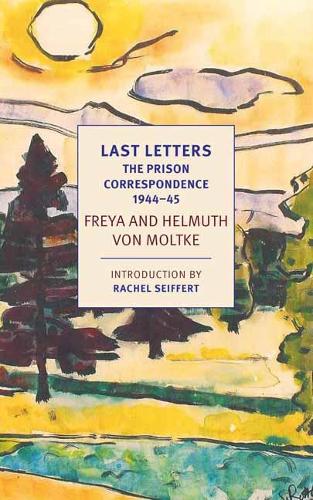
Last Letters: The Prison Correspondence between Helmuth James and Freya von Moltke, 1944-45
(Paperback, Main)
Publishing Details
Last Letters: The Prison Correspondence between Helmuth James and Freya von Moltke, 1944-45
By (Author) Helmuth Caspar von Moltke
By (author) Johannes von Moltke
New York Review Books
NYRB Classics
17th September 2019
17th September 2019
Main
United States
Classifications
General
Non Fiction
940.5343092
Physical Properties
Paperback
380
Width 127mm, Height 203mm
Description
Available for the first time in English, a moving prison correspondence between a husband and wife who resisted the Nazis. Available for the first time in English, a moving prison correspondence between a husband and wife who resisted the Nazis. Tegel prison, Berlin, in the fall of 1944. Helmuth James von Moltke is awaiting trial for his leading role in the Kreisau Circle, one of the most important German resistance groups against the Nazis. By a near miracle, the prison chaplain at Tegel is Harald Poelchau, a friend and coconspirator of Helmuth and his wife, Freya. From Helmuth's arrival at Tegel in late September 1944 until the day of his execution by the Nazis on January 23, 1945, Poelchau would carry Helmuth's and Freya's letters in and out of prison daily, risking his own life. Freya would safeguard these letters for the rest of her long life. Last Letters is a profoundly personal record of the couple's fortitude in the face of fascism.
Reviews
This is a Taj Mahal of correspondencea monument to married love. . . . the heights and depths make harrowing reading. John Arnold,Church Times
[The] letters and the explanatory footnotes reveal a deep love bolstered by a building religious devotion . . . A compelling, profoundly emotional Nazi-era story that also serves as a reminder of the power of letter writing. Kirkus
[A]story of the triumph of love between a couple whose lives were torn apart by the Third Reich but whose letters should certainly belong to any anthology of 'classic' correspondence and who played their part in the history of the humanisation of their country. . . . [T]hey deserve to be read now as widely as possible: a demonstration of the heights to which the human spirit, nourished by faith . . . can rise over adversity. Francis Phillips,Catholic Herald
"Last Letters documents what the Song of Songs calls 'love as strong as death,' or even stronger: the unbreakable connection between two courageous people who managed to maintain faith and love in nearly unimaginable circumstances." Elaine Pagels
The four-month daily correspondence between Helmuth von Moltkeimprisoned resistance leader awaiting almost certain but unscheduled executionand his wife Freya, who would serve humanitarian causes for another 65 years, is a devastating testimony to courage, family love, and the consolation of religious faith. It also reveals the Nazi jurists implacable legal reasoning as well as the Moltkes hope somehow to delay the sentence by working the corridors of a regime in denial of its own imminent extinction. Charles Maier
These letters form an extraordinary zone of light in the darkest of times. The writers think lucidly and eloquently about who they are and where they are, and by the extension about who we are or might be, if we care enough about humanity to stand firm against its worst abusers. An unforgettable book. Michael G. Wood
"Any tale of brave resistance to political tyranny elicits profound admiration. But told through the intimate correspondence of a wife and her husband,this oneacquires an extraordinary vitality and poignancy. Here we witness at close quarters the human costs of courage and its more-than-human springs. The sight is achingly, commandingly beautiful." Nigel Biggar, Regius Professor of Moral and Pastoral Theology, University of Oxford
Bombs are falling, the Russian front is closing in, and the Nazi law machine grinds along, preparing cases, examining witnesses, churning out death sentences. In the midst of this destruction takes place the extraordinary leave-taking between Freya and Helmuth James von Moltke recorded in this volume. Through their letters, full of desperate humanity, they find a deeper personal connection, in defiance of the regime that seeks to crush them. Martin Puchner, author ofThe Written Worldand editor ofThe Norton Anthology of World Literature
[F]illed with love and soul-searching, honest attempts to sift through their fears and understand their fates, and, increasingly, to find solace in their strong Christian faith.Danna Harman,
Haaretz
Author Bio
In 1935, after turning down an opportunity to become a judge because the job would require him to join the Nazi party, Helmuth James von Moltke (1907-1945) began a practice of his own in Berlin that helped Jews and other persecuted peoples emigrate from Germany. In 1939, von Moltke was drafted into the German counter-intelligence service. He soon became a leader of those opposed to the Nazi party, leading to his eventual arrest and execution. Freya von Moltke (1911-2010) was part of the anti-Nazi opposition group, the Kreisau Circle, which she helped to form with her husband Helmuth. After World War II, Freya left Germany and settled in South Africa with her two sons. Unable to tolerate Apartheid, however, Freya returned to Berlin in 1956 and eventually settled in Norwich, Vermont, where she lived until her death. Helmuth Caspar von Moltke is a retired lawyer and the son of Freya and Helmuth von Moltke. He lives in Vermont, Quebec, and Berlin. Johannes von Molkte is a professor of German and Film, Media and Television at the University of Michigan and the grandson of Freya and Helmuth von Moltke. Dorothea von Molke is co-owner of Labyrinth Books in Princeton, NJ, and the granddaughter of Freyaand Helmuth von Moltke. Shelley Frisch's translations from German, which include biographies of Friedrich Nietzsche, Albert Einstein, Leonardo da Vinci, Marlene Dietrich/Leni Riefenstahl (dual biography), and Franz Kafka, along with many other works of fiction and nonfiction, have been awarded numerous translation prizes. She has chaired the Helen and Kurt Wolff Translator's Prizejury since 2015. Rachel Seiffert is a British novelist and short story writer.
